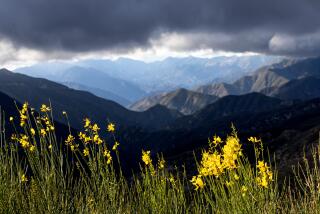Growers Relieved as Cold Front Misses Area : Weather: Some farmers stay at their wind machines and smudge pots all night to battle the expected freeze. But no significant damage is reported.
- Share via
A last-minute shift in wind pushed a frigid mass of Arctic air toward the Rocky Mountains on Sunday, sparing Ventura County farmers from further damage to crops hit hard by freezing temperatures about a week ago.
“We seem to have dodged a major bullet,” said Rex Laird, executive director of the Ventura County Farm Bureau. “We were expecting a front that was going to be even colder than the one that hit us last week. But it seems to have veered over toward Arizona.”
As a result, he said, the county’s farmers reported no significant damage from the air mass that comes over the North Pole from the Soviet Union, sometimes called the Yukon Express.
Braced for colder weather, some farmers stayed up through the night turning wind machines on and off and preparing to ignite smudge pots if needed. Yet even in the coldest spots near Ojai and northern canyons, temperatures held above levels that can harm avocados, citrus and other crops. Farmers say it takes several hours of temperatures of 28 degrees or lower to begin crop damage.
For the next week at least, slightly warmer weather should hold, said National Weather Service meteorologist Terry Schaeffer. He predicted moderate temperatures, with westerly winds bringing increased humidity by the end of the week. Such conditions generally favor farmers, he said.
Tom Pecht, an avocado and lemon farmer near Oxnard, said he turned on wind machines twice Sunday morning when temperatures fell to about 30 degrees. With these giant fans, farmers can stir up warmer air that will prevent the chill from settling on their crops.
“That brought it up to 34 or 35, so we turned the machines off,” he said. “I feel quite lucky, especially since the earlier warning called for the coldest Arctic air mass I have ever seen.”
The turn toward relatively mild weather contrasted sharply with temperatures just a week ago, when the county’s farmers suffered an estimated $100 million in losses, mainly in avocado and citrus crops. In the hard freeze of Dec. 22-23, Ojai temperatures sank as low as 15 degrees.
Early Sunday morning, the coldest readings in the county were in the upper 20s in the Ojai Valley, Schaeffer said. “But that was only for a short duration.”
Schaeffer said other early-Sunday low temperatures remained above freezing--between 35 and 40 degrees--in most farming areas, including the Santa Clara River Valley and the Santa Rosa and Las Posas valleys. Parts of the Oxnard Plain were even warmer, with lows of about 40 degrees, he reported.
“Just a slight shift in direction by the coldest air would have resulted in further losses,” Schaeffer said.
Laird warned that it will be at least another two months before farmers can consider themselves safe from another crop-damaging freeze. “You’re usually out of the woods by March 1,” he said.
Some farmers believe the freeze season lasts even longer than that. “Old-timers will tell you it starts Oct. 15 and runs until April 15,” said Don Reeder, president of the County Farm Bureau and manager of Pro-Ag Inc., which has 2,000 acres scattered throughout the county.
“I feel lucky,” he said. “But don’t forget, January and early February are the coldest parts of the year.”
Ironically, Schaeffer said the first freeze made it less likely that cold weather would inflict further damage to crops in vulnerable areas.
“It would take extremely low temperatures to do more damage to fruit in some areas,” he said. “But, of course, these same farmers now have to worry about permanent damage to their trees.”
More to Read
Sign up for Essential California
The most important California stories and recommendations in your inbox every morning.
You may occasionally receive promotional content from the Los Angeles Times.













